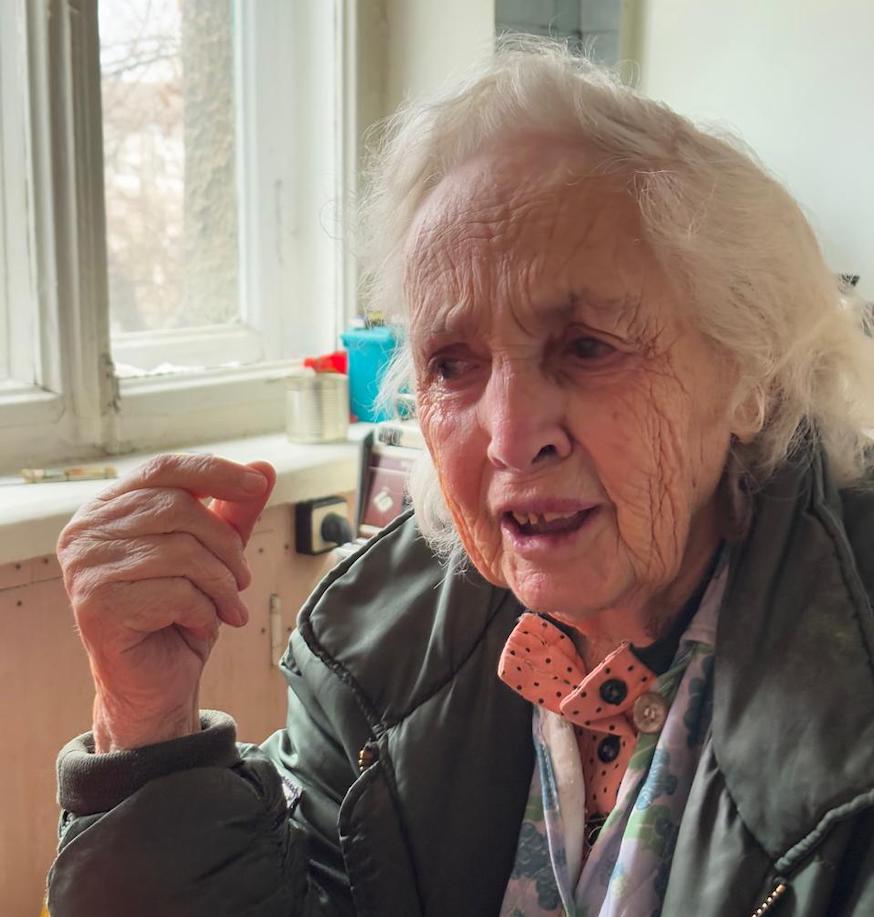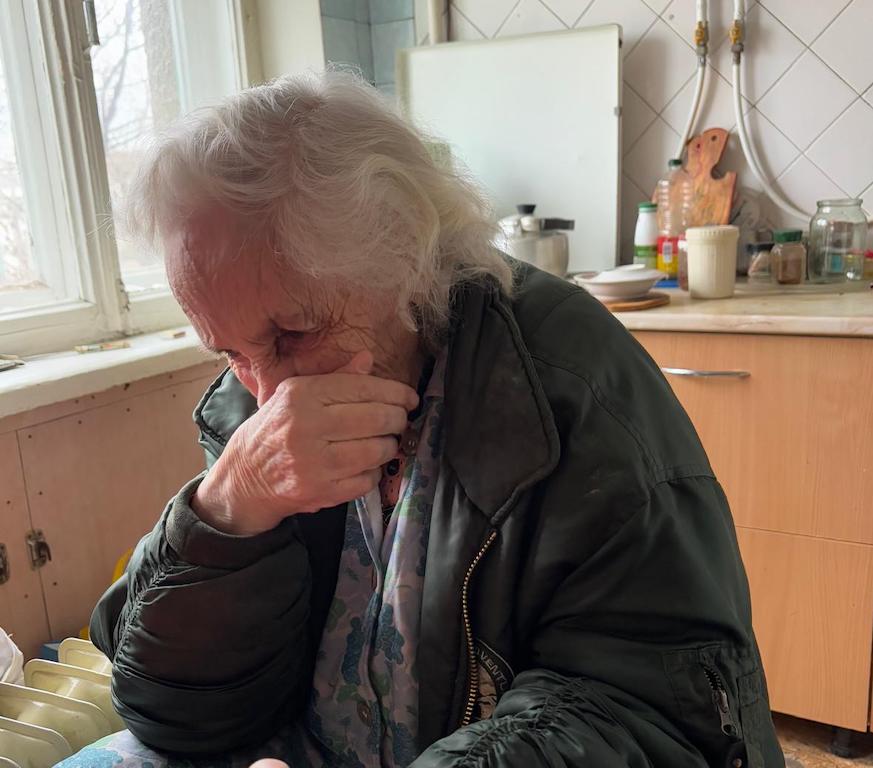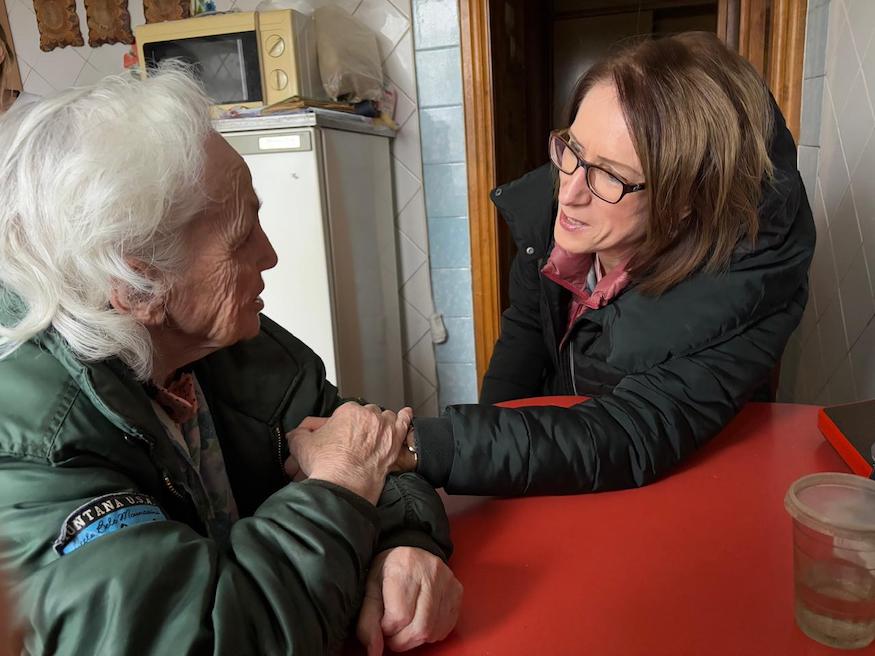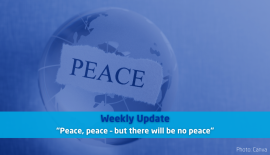Bringing Hope to a Gloomy City
Three years into the Russian war in Ukraine, which has already lasted longer than the German occupation during World War II, the Christians for Israel team continues to bring hope and help to Ukraine’s broken-hearted Holocaust Survivors and needy elderly, whose lives were shattered a second time. Going to Nikolayev is not an easy decision to make as the city is very close to the battlefront, getting shelled daily. And yet, imagining the joy in the eyes of the lonely prevails. None of the practical supplies are nearly as important to the elderly as the sheer fact that someone comes to see them in their time of need.
Lately, our visits to the Jewish communities in Ukraine always have two parts. We have come to realise that loneliness is now the number one worst disease for the survivors, so we try to find a halfway safe location to invite all those who are able to come and feast at our table. Get the good dress out of the wardrobe, do up the hair, put the lipstick on and sit next to friends for a few hours as in the good old days, listening to a word from the rabbi and to our greetings from Christian supporters from all over the world, enjoying a little concert while indulging in a lovingly prepared meal and walking home with a small gift.
Once we mix with and bring joy to everyone who is still mobile enough to go out, we visit all those who are no longer able to walk down the steps from their fifth-floor-apartment without an elevator, where they spend years imprisoned in their four walls.
“A bouquet of flowers at the table by the entrance. For us? From Alla? Alla the Holocaust Survivor?”
Who brought the flowers?
At our recent gathering at Nikolayev’s historic synagogue, where we spent a happy afternoon of fellowship to the sound of violins, someone had placed a bouquet of flowers at the table by the entrance. We asked around and couldn’t believe our ears. For us? From Alla? Alla the Holocaust Survivor? We placed Alla first on our list of visits for the next day.
Nikolayev used to be a prosperous city because of the famous Soviet shipyard. Now we are wondering how anyone can still live here. We drive past many houses with missing windows, sometimes entire pieces torn out of tall buildings.
Alla’s tears
We sit down at Alla’s kitchen table. We don’t have to ask about her story—it flows automatically from her trembling lips. Alla has gone completely blind, but she can see the memories clearly in her mind’s eye.
“One day, they started deporting the young women to Germany for forced labour.”
“Mom was Ukrainian, Dad was from the Karaim, the Crimean Jews. Like all the other men, he had to go to the front. We were sent to the concentration camp with Mom. They moved us from one camp to another. One day, they started deporting the young women to Germany for forced labour. The guards were just about to load them onto the trucks, when my brother saw my mother calling for us from the back of the truck.

However painful it may be to remember, Alla feels she needs to share what she went through – from her childhood to today | Photo: Christians for Israel

Alla fights back tears as she remembers seeing her mother deported for forced labour | Photo: Christians for Israel
“He came running to me: ‘Alla, they’re taking Mom away! Come quickly!’ We ran after them, me crying in despair and screaming for my mother. A soldier got annoyed and shot at me. I had several bullets in my thigh, a bullet in my stomach and three broken ribs. So my brother carried me into some barn.”
Now the two children had to fend for themselves. Tears run down Alla’s cheeks as she remembers the agony.
Alone—over and over again
“We had to hide—one day in the sewers, another in cellars and attics and ruins. Mom was put on a train to Germany with the other women. In Poland, the partisans attacked the train. Mom was able to escape. She found us. How? She searched the hiding places where we had been hiding before. Mom’s return was such a relief for us. Now she was able to take care of us again.”
The family survived the war, but the post-war period didn’t bring much comfort.
“They took blood from a lot of Jewish children in the concentration camp —blood reserves for the Wehrmacht”
“Dad was seriously wounded at the front,” Alla continues. “He was sent to a military hospital in Tashkent. He met another woman there. He never returned to us. We lived in such poverty after the war. Mom had to support us on her own. And then my brother died shortly after the war, in 1947. They had taken a lot of blood from him in the concentration camp. They did that with a lot of Jewish children—blood reserves for the Wehrmacht. Then I was alone with my mother. She gave everything for us.”
Even after the war, ‘Jew’ remained a dirty word in Alla’s environment. Little has changed for her to this day. “I asked my household helper not to call me by my proper father’s name—Alla Isaakovna. I changed my name to Alla Ivanovna. I don’t want the neighbours to know that I have Jewish roots. There are so many people who are now suddenly jealous that the Jews are getting help, especially the Holocaust survivors. This is dangerous.”
A precious crown
There is one more thing that hurts Alla— perhaps most of all. “I’ve been called a Jew my whole life; I’ve suffered so much for my Jewish roots. And I’m not considered Jewish by the Jewish community because only my father was Jewish. I don’t need any help; that’s not my point. But for the orthodox community, I don’t belong. That’s very bitter.”
All the more reason for Alla’s blind, tear-filled eyes to shine as she hears how important she is to us; how important she is to God her Maker as we read these words from the scriptures to her: “You will be a crown of splendor in the Lord’s hand.” (Isaiah 62:3).
“I am so moved that you are visiting me! I so much enjoyed our gathering yesterday! The violins reminded me of when I buried my mother. It made me cry. It was such a beautiful concert. Before we left the house, I said to my helper, ‘Yelena, we have special guests coming. We have to welcome them properly!’ That’s why I bought flowers for you.”
You can support first- or second-generation Holocaust survivors in Ukraine and Moldova through Christians for Israel. Our workers on the ground make sure that the help arrives and that the message of love is conveyed during personal visits.
Support in €
Donate in US $





